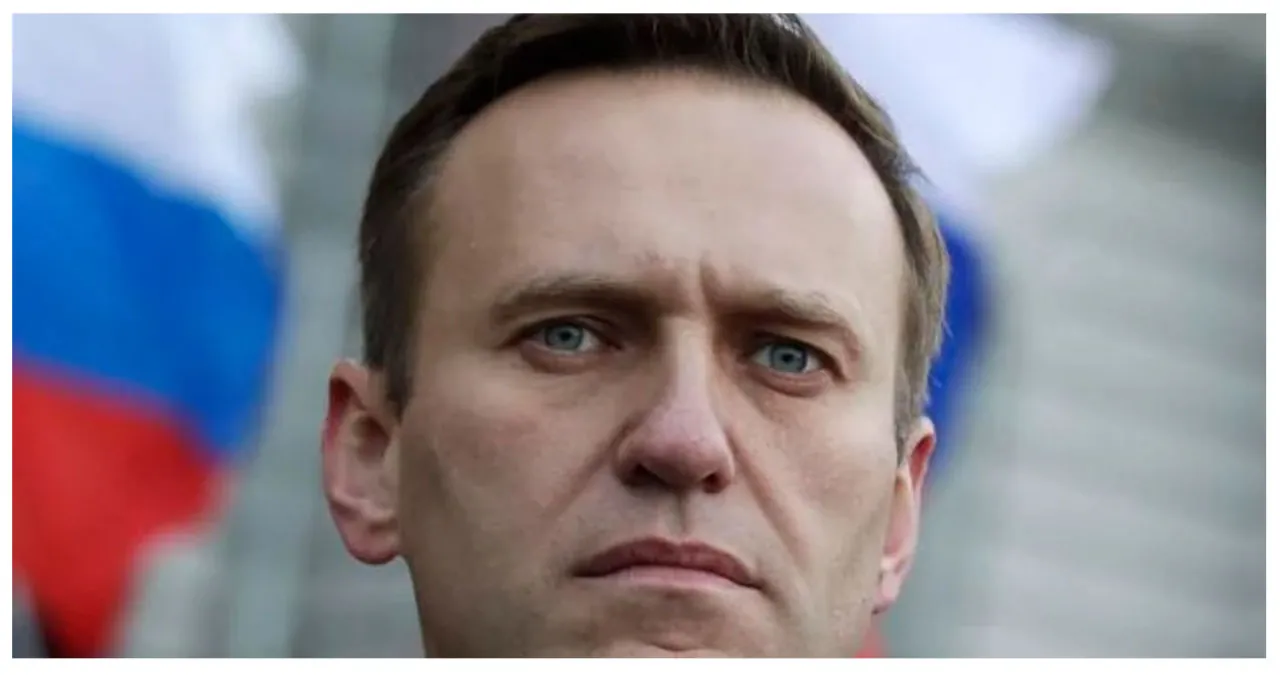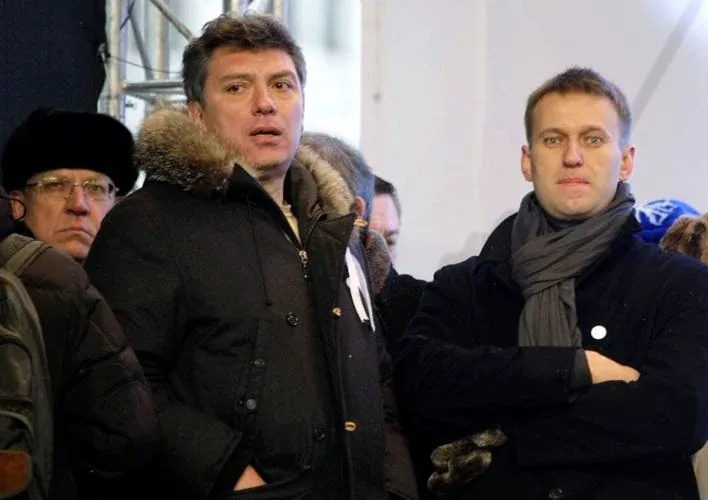Alexei Navalny, the most prominent opponent of Russian President Vladimir Putin, who fought against government corruption and organized large-scale protests against the Kremlin, passed away in prison on Friday, according to Russian authorities. He was 47 years old.
Navalny, who had been serving a 19-year sentence on charges of extremism, experienced a sudden illness after going for a walk, as reported by the Federal Penitentiary Service. He subsequently lost consciousness and despite the arrival of an ambulance to provide medical assistance, he tragically passed away. The cause of his death is currently under investigation.
Russian President Vladimir Putin was notified about the death of Alexei Navalny, and the prison service will conduct an investigation following standard protocols, according to Kremlin spokesman Dmitry Peskov.
According to Navalny’s spokeswoman, Kira Yarmysh, there is currently no confirmation of the politician’s death. She stated on X (formerly known as Twitter) that his team is still awaiting updates, and his lawyer is en route to the town where he is being detained.
Navalny had been imprisoned since January 2021 after he returned to Moscow from Germany, where he had been recovering from nerve agent poisoning that he attributed to the Kremlin. Prior to his arrest, he actively fought against government corruption, organized significant anti-Kremlin demonstrations, and even ran for public office.
He has been given three prison sentences, all of which he dismisses as politically motivated.
Shortly after the news of Navalny’s passing emerged, the Russian SOTA social media channel released images of the opposition leader supposedly in court the previous day. The footage captures Navalny standing up, engaging in laughter and banter with the judge through a video link.
In December, Navalny was transferred from a prison in central Russia to a highly secure “special regime” penal colony located above the Arctic Circle.
Navalny’s supporters strongly criticized the decision to relocate him to a colony in the town of Kharp, situated in a region approximately 1,900 kilometers (1,200 miles) northeast of Moscow. They viewed this move as yet another tactic to stifle Navalny and prevent him from speaking out.
In Putin’s Russia, political opponents frequently vanished in the midst of factional disputes or were forced into exile after being imprisoned, suspected of being poisoned, or facing other forms of harsh repression. However, Navalny managed to grow stronger and ultimately became the face of the opposition through his determination, courage, and a keen awareness of how social media could bypass the Kremlin’s suppression of independent news sources.
Facing every setback, be it physical assault or imprisonment, he tackled them with unwavering dedication, meeting dangers head-on while maintaining a sharp sense of humor. This resolute spirit led him to make the audacious and consequential decision to return from Germany to Russia, knowing that it would inevitably lead to his arrest.
Navalny was born in Butyn, a small town located approximately 40 kilometers (25 miles) outside Moscow. In 1998, he obtained a law degree from People’s Friendship University, and later pursued a fellowship at Yale in 2010.
By focusing on corruption within Russia’s complex web of politicians and businesses, he garnered attention. One of his initial strategies involved acquiring a stake in Russian oil and gas companies, enabling him to become an activist shareholder and advocate for increased transparency.
Navalny’s focus on fighting corruption resonated with the Russian people on a personal level. He tapped into their deep-seated frustration of being deceived and cheated, making his cause more relatable and tangible than lofty debates about democracy and human rights.
In 2013, he faced embezzlement charges and claimed that it was a politically motivated prosecution. He was ultimately convicted and sentenced to five years in prison. However, to everyone’s surprise, the prosecutor’s office later requested his release pending appeal. Eventually, a higher court gave him a suspended sentence.
The day prior to his sentence, Navalny officially entered the race for Moscow mayor. While some viewed his release as a response to the massive protests in the capital, others believed it was a strategic move by the authorities to lend some credibility to the upcoming mayoral election.
Navalny achieved a remarkable second-place finish, a noteworthy feat considering he was up against the incumbent candidate who had the support of Putin’s political apparatus and enjoyed popularity for his efforts in enhancing the infrastructure and appearance of the capital city.
The popularity of Navalny grew following the tragic assassination of Boris Nemtsov, a prominent and charismatic politician, in 2015. Nemtsov was shot and killed on a bridge near the Kremlin, further fueling support for Navalny.
Whenever Putin discussed Navalny, he consistently avoided mentioning the activist by name, opting instead to refer to him as “that person” or using similar language. This deliberate choice seemed to be an attempt to downplay Navalny’s significance.
Navalny, even among opposition circles, was sometimes seen as having a strong nationalist inclination due to his support for the rights of ethnic Russians. One example of this was his endorsement of Moscow’s annexation of the Crimean Peninsula in 2014, despite it being deemed illegal by most nations. However, he was able to surpass these concerns by leveraging the influence of the investigations conducted by his Fund for Fighting Corruption.
Navalny’s investigations may have been ignored by state-controlled TV channels, but they certainly struck a chord with younger Russians through his YouTube videos and posts on his website and social media accounts. This clever strategy enabled him to connect with people in the remote areas, far from the usual political and cultural hubs of Moscow and St. Petersburg, and build a robust network of regional offices.
His work expanded beyond the investigation of corruption to encompass a comprehensive critique of the political system under Putin, who has been in power in Russia for more than two decades. He played a pivotal role in mobilizing protests of extraordinary magnitude against questionable national election outcomes and the marginalization of independent candidates.
Navalny knew that capturing attention required using concise and impactful language. His characterization of United Russia, Putin’s power-base, as “the party of crooks and thieves” instantly resonated with the public. Additionally, his in-depth investigation into Dmitry Medvedev’s extravagant country retreat was simplified to focus on the luxurious duck house within the complex. This led to a wave of comical yellow duck toys being used as a means to mock the Prime Minister.
Things were about to get much worse.
During his imprisonment in 2019 for participating in an election protest, he fell ill and was transferred to the hospital. Although authorities claimed it was due to an allergic reaction, some medical professionals suspected that it might actually be a case of poisoning.
On August 20, 2020, he fell seriously ill during a flight from the Siberian city of Tomsk to Moscow, where he was coordinating opposition candidates. He collapsed in the aisle upon returning from the restroom, leading the plane to make an emergency landing in Omsk. He remained in a hospital in Omsk for two days while his supporters pleaded with doctors to allow him to be transferred to Germany for medical treatment.
Once he arrived in Germany, doctors confirmed that he had been poisoned with a strain of Novichok, which is reminiscent of the nerve agent that had previously targeted former Russian spy Sergei Skripal and his daughter in England in 2018, ultimately leading to the death of another individual.
After being placed in a medically induced coma for approximately two weeks, Navalny faced a challenging journey towards regaining his speech and movement over the course of several more weeks. Demonstrating his resilient sense of humor, his first communication during his recovery was an Instagram post in which he cleverly highlighted the underestimated significance of breathing on one’s own: “Breathing on one’s own is a remarkable process that is often overlooked. I highly recommend it.”
The Kremlin denied any involvement in the poisoning, but Navalny countered with a bold move – a lethal prank phone call. He shared the recording of a call he claimed to have made to a supposed FSB officer, part of a group responsible for the poisoning and subsequent cover-up. The FSB, however, dismissed the recording as a fake.
Russian authorities increased the pressure by stating that Navalny had breached the conditions of a suspended sentence for one of his embezzlement convictions while he was in Germany. They made it clear that if he were to return to Russia, he would be arrested.
Navalny, true to his nature, chose not to stay abroad. Instead, he and his wife made the decision to board a plane bound for Moscow on January 17, 2021. Upon arrival, he expressed his contentment at being back and proceeded to passport control, where he was promptly taken into custody. Remarkably, in a span of just over two weeks, he underwent a trial, received a conviction, and was ultimately sentenced to 2½ years in prison.
Massive protests erupted across Russia, extending to even the most remote corners of the country. The demonstrations resulted in the unprecedented detention of over 10,000 individuals by the police.
During the award ceremony, Navalny’s wife also took the opportunity to address the audience. She expressed her deep concern for her husband’s situation, emphasizing that he is being unjustly imprisoned for simply speaking the truth and defending democracy. With unwavering love and hope, she expressed her dream of seeing him free one day, along with the hope of a free and democratic country. She concluded her heartfelt message by encouraging him to stay strong.
Navalny leaves behind a son and a daughter, in addition to his wife.


